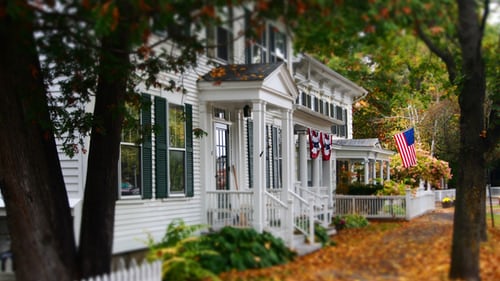If a Tree Falls on Your House and You Are Not There to Hear It, does it Still Destroy Your House?
Ponder the philosophical question, “If a tree falls in the woods and there is nobody there to hear it, did it make a noise?” Many argue that it does not because there will only be sound if people hear it, as sound is mankind’s perception of air vibrations. But technically, it does, as sound is not limited to human perception. Sound exists whether or not there is someone to hear it.
Now, let us tweak this question and suppose that it happened in communities around New Jersey. The state encounters storms and hurricanes each year, which is one of the main reasons for downed trees. These incidents cause extensive disturbances like blackouts and congestion. Apart from that, fallen trees can also land directly onto houses, damaging the home in many ways and putting the occupants in danger.
But, relating to the philosophical question mentioned earlier, what if the tree falls on the house and the occupants are not there to see it? Does it still destroy the house? Of course, it does! And homeowners should not neglect the damage that might worsen over time.
What to do When a Tree Falls onto a House?
A tree failure, no matter what caused it, might completely destroy the house and cause substantial damage to all its major structural components. On the other hand, some residential properties might withstand the force of the falling tree and only sustain less significant damage.
Whether the structure was a total loss or only sustained minimal damage, a house with a tree that fell onto it is not a welcome sight for anyone. Apart from the financial stress to the residents, cleaning up a broken tree is not an easy task. Homeowners should hire professional services to clear trees and fix the damaged parts of the house.
The inhabitants must evacuate the house to avoid personal injury; not even worrying about valuables. Apart from hiring professional services to take care of the tree removal, it is also vital to immediately contact a structural engineer in New Jersey to help assess the damage and repairs needed in the house.
Importance of Hiring a Structural Engineer
Similar to when a hurricane or snowstorm hits a neighborhood, it is necessary to immediately assess the damage caused by a fallen tree to ensure that the house is still safe for occupancy. People who see only the minor flaws might try to fix them independently without realizing the extent of the defects.
Getting the help of NJ structural engineers can give homeowners a clear picture of the degree of damage sustained by the house. Some cracks and faults might be invisible for many, so bringing in an expert will come in handy. Their report will contain detailed insights on the structure’s condition and their recommendations for repairs or restorations.
Structural engineers in NJ will conduct a technical review of the house and look for hints of damage across the building. They will thoroughly check the façade and roofing since these are usually the most affected by the incident. They will also examine the foundation and components of the building frame to see if they are still in good condition. Furthermore, the engineers will inspect the different systems of the house, such as the HVAC, plumbing, and electrical systems.
Following the inspection, the engineers will prepare a written report for the homeowners. The residents need to make good use of the data and findings in the report to ensure the soundness of their homes. Accordingly, the occupants should immediately schedule repairs with the help of construction services and avoid delaying them.
Other Structural Damage Caused by Trees
A tree falling directly onto a house remains one of the most significant risks for homeowners, but that doesn’t mean that trees cannot damage the structure in other ways. Unmaintained trees can cause structural damage to houses and buildings from below and above the ground.
For example, the roots can damage the water or electrical system and foundation of the building by growing far away from the trunk to find moisture and nutrients to absorb. The soil underneath houses or buildings is typically dry, but a damaged sewage system or water supply can make it easy for the roots to crawl under the property and cause damage.
Apart from that, excessive tree branches and limbs can also break the siding of the house. Once broken off and blown away by a strong wind, these branches will hit the structure’s windows, doors, and other external parts. They can also cause severe damage to the roof if not trimmed regularly.
Massive Structural Damage Can Be Prevented
In a state that receives approximately 25 to 30 thunderstorms a year, trees can become safety hazards to residential properties in NJ. The frequency of tree failure and property damage from trees keeps increasing, resulting in almost $1 billion of structural damage annually.
Once a tree falls onto a house, the residents need to address the issue right away and make necessary preparations to minimize hazards in the future. Immediately contacting professional services to clean the debris and hiring structural engineers to determine the damage can prevent it from worsening. The report from the engineer can also help homeowners identify areas that need reinforcement to make them sturdier should a similar incident happen again.
The engineers at Lockatong Engineering can help make sure that residential and commercial buildings are structurally sound and up to code. They offer a comprehensive property inspection, including a focused inspection of a single feature, evaluating a home’s current structure, phased inspections across the life of a construction venture, or structural design services for a renovation or addition.
Contact us today to schedule a structural inspection with a professional New Jersey structural engineer from Lockatong Engineering.








